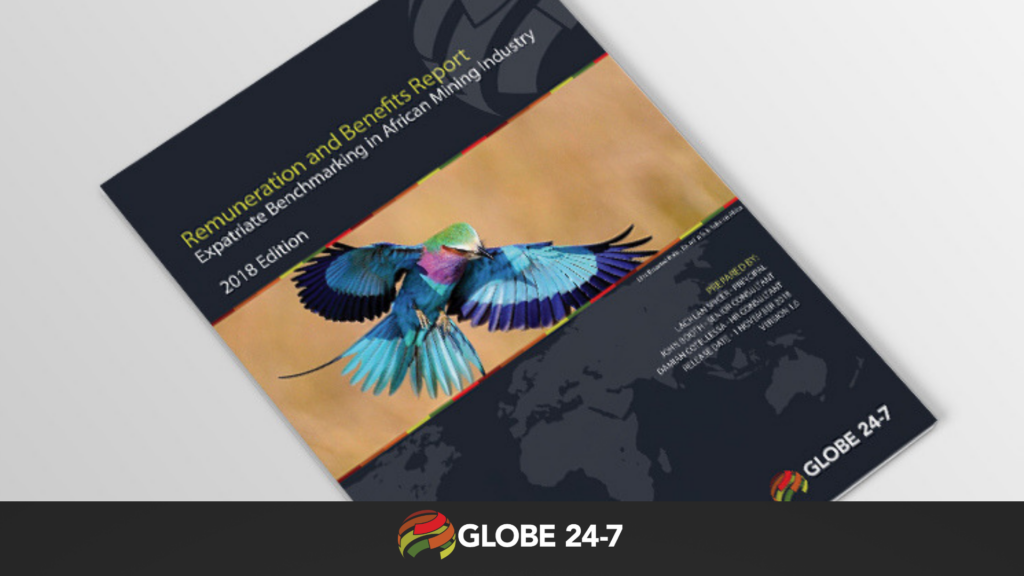SALARIES for mining expatriates working in Africa have plateaued in 2018 with only two-thirds of companies increasing wages according to African-specialist HR consultancy firm Globe 24-7.
Globe 24-7 has released its annual African Remuneration and Benefits Benchmarking Report which gathers expatriate remuneration, benefits and employment conditions data from ASX, TSX, JSE and AIM-listed mining companies operating in Africa.
Globe’s CEO & Principal Lachlan Spicer said that the Report provided valuable insights into the current employment market for expatriates working in Africa stating “now in its 6th year, the Report continues to provide robust quantitative data to help mining companies better understand the African expatriate landscape in which they operate. We are very pleased to have had so many companies participate in this year’s benchmarking program”.
The Report details 40 pages of findings, benchmarks and insights sourced from a dataset of 3000 expatriate employees working in 30 companies across 13 different commodities in Africa.
Globe’s study has found that expatriate salary levels have steadied in 2018 evidenced by a slight decrease (1.3%) in average overall salaries for new hires compared to the year before. This is in contrast to a strong 2017 which bounced-back from very lean years during ‘15 & ’16. Looking towards 2019, salary levels are likely to remain the same as more than 50% of employers are forecasting no salary increases for the year ahead and for those that do expect to give an increase, it will only be a minimal amount on average of 1.5%.
Involuntary turnover for FIFO expatriates has continued the trend downwards in 2018 to 6% decreasing from 11% in 2017 and 18% in 2016 which further highlights that stability has returned. Many companies have settled on the right size of their expatriate workforce and the deep expatriate cost cutting experienced in previous years has well and truly gone. Worth noting is the slight but regular increase in voluntary turnover to 11% on an annualised basis, from 9.4% in 2016 and 10% in 2017. This could indeed herald the return of a more ‘employee-oriented’ market.
With employees not receiving material gains this year, the continued strength of the US dollar against other currencies has proven beneficial to the 90% of expatriate workers paid in USD. Spicer commented that “even though salaries have settled for many expatriates, the strong USD means take home pay and subsequent buying power in their home country remains greater than working domestically meaning expatriate work is still proving attractive”.
A challenge facing the African expatriate market in 2019 will be South Africa’s change to their taxation legislation which will see resident South African’s no longer exempt from income tax on foreign sourced income. According to Globe’s Report, South African nationals make up nearly 30% of all expatriates working in greater Africa which will certainly have an impact on future workforce demographics for the industry.
Short Term Incentive (STI) programs remain an important component of the industry’s compensation make-up. Almost 80% of surveyed Expatriates were eligible to participate in such programs with STI pay out representing on average 17.1% of Base Salary. Long Term Incentive scheme’s (LTI’s) however continue to decline in popularity with just 64% of companies now oufb00ering an LTI program to their expatriate workforce, down from 69% in 2017 and 79% in 2016. This can be attributed to some companies moving away from such schemes due to onerous taxation implications and the complexity involved in setting up and maintaining such programs.
Beyond compensation, the Report also benchmarks FIFO & Residential employment conditions, employee benefits and other HR practices. This is why, according to Spicer, this comprehensive report “acts as a toolkit to help companies make day-to-day decisions concerning their expatriate workforces along with providing valuable insights for establishing more strategic HR policy”. This year has also seen Globe introduce an online Remuneration Portal that “allows 24/7 access to live salary data to help business leaders make compensation decisions at the click of a button”.
The Report was released on November 1, 2018.
About Globe 24-7’s Salary Benchmarking Reports
Globe 24-7 is an international mining HR Consulting Firm who are commissioned to conduct regular salary benchmark programs for the global mining industry. Over the past 15 years, Globe has partnered with hundreds of mining houses throughout Africa, Asia Pacific and Latin America to produce local national and expatriate Salary Benchmark Reports.
Specific to Africa, Globe has recently completed national benchmark studies in Burkina Faso, Cote d’Ivoire, Mali, Ghana, Mozambique, Senegal, Madagascar and the DRC and have also been commissioned to run Executive-level compensation benchmark studies in North America and Australia for junior and mid-tier mining companies.
For more information please contact Globe 24-7 at administration@globe24-7.com

